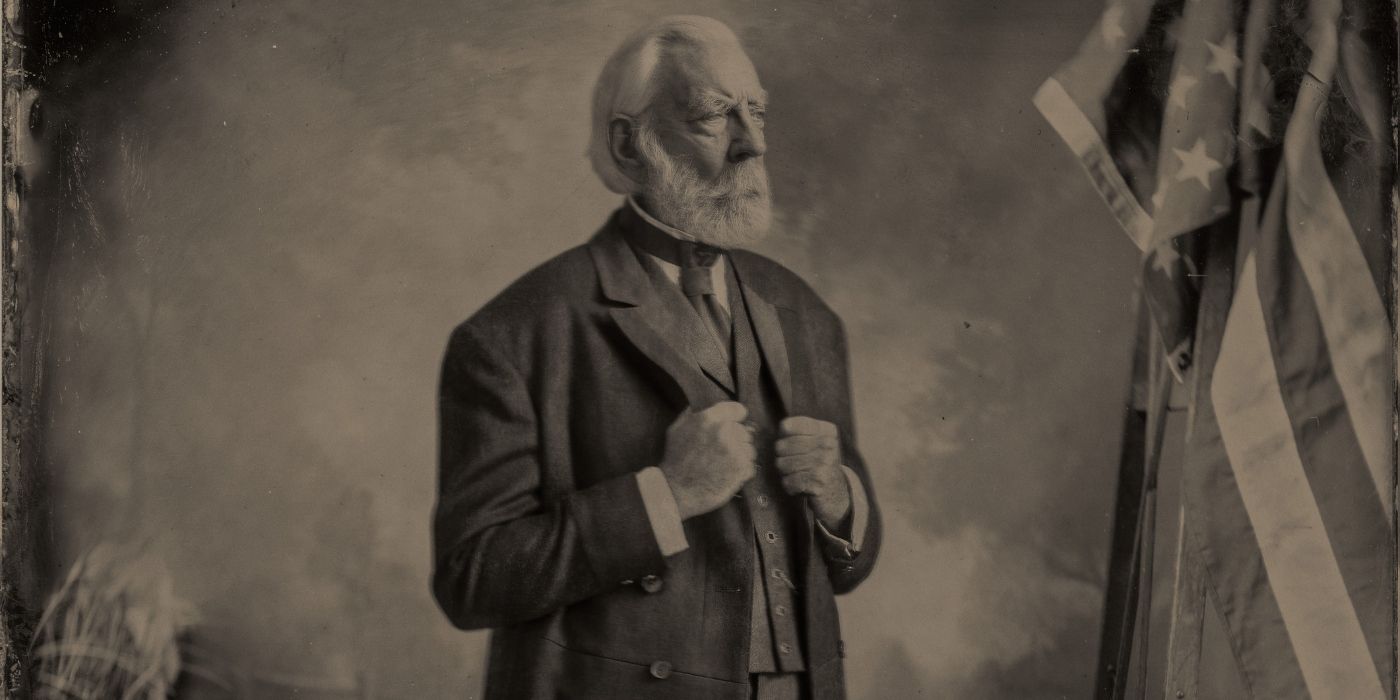Editor’s note: The below contains spoilers for Lawmen: Bass Reeves.
The Big Picture
- Paramount+ series Lawmen: Bass Reeves explores the life of Bass Reeves, the first African-American deputy U.S. marshal.
- Donald Sutherland’s portrayal of Judge Isaac Charles Parker in the series leaves a lasting impact. The real Parker brought honesty and fairness to the once-lawless land and earned the nickname “The Hanging Judge.”
- Judge Isaac Parker’s legacy has been misunderstood, as he was not a bloodthirsty villain but a proponent of justice. He advocated for marginalized groups and was against capital punishment.
Paramount+’s Lawmen: Bass Reeves, created by Chad Feehan, dramatizes the life of the titular Reeves, the first African-American deputy U.S. marshal west of the Mississippi River. It isn’t the first time that Reeves has been on the television screen (he’s even earned a shoutout on The Simpsons), but with the series, the life of the iconic peace officer is given the time to be explored far more in-depth than previous depictions. By most accounts, the series has been successful in doing so, with Collider’s own Carly Lane giving high praise to David Oyelowo‘s captivating performance as Reeves in her review. Oyelowo’s Reeves commands the screen, as well he should, but actors in the smallest of appearances have also left indelible marks on the series, and perhaps none as effectively as the esteemed Donald Sutherland, cast as the infamous Judge Isaac Charles Parker. But in order to truly appreciate Sutherland’s performance, one has to know the story behind the man he is playing, and the story of Parker is one that might just leave you hanging.
Lawmen: Bass Reeves
- Release Date
- November 5, 2023
- Cast
- David Oyelowo, Dennis Quaid, Joaquina Kalukango, Justin Hurtt-Dunkley
- Main Genre
- Western
- Genres
- Drama, Western, Biography
- Seasons
- 1
- Creator
- Chad Feehan
Isaac Parker Began Studying Law at a Young Age
Joseph and Jane Parker welcomed Isaac Parker into the world on October 15, 1838, in Barnesville, Ohio. His father was a hard-working farmer, and his mother an intellectual with an acumen for business (Parker credited his success to the environment his parents raised him in). At the age of seventeen, Parker began studying law, starting his journey as an apprentice to a lawyer in town. In 1859, Parker passed the bar and worked with his uncle’s law firm in St. Joseph, Missouri before starting his own firm in 1861. Following a time as district attorney and a presidential elector for Abraham Lincoln, Parker was elected to a judgeship in 1868, and in 1870 began serving the first of two terms in the U.S. Congress.
Parker’s time in Congress was progressive, fruitful, and impactful. Parker secured pensions for veterans in his district and pushed for the construction of a new federal building in St. Joseph, but it would be his actions on behalf of two different classes of American citizenry that spoke volumes: women and Native Americans. Parker sponsored legislation that would not only have allowed women the right to vote but also the right to hold public office. He also sought to create legislation that would have seen the Indian Territory organized under a formal territorial government. His support of the Bureau of Indian Affairs, and a drive to draft meaningful policies for Native Americans, particularly seeking fair treatment of the tribes living in the Indian Territory, brought the young Congressman to the attention of the national media. After his second term, he looked to gain a presidential appointment as judge of the Western District of Arkansas in Fort Smith. On March 18, 1875, President Ulysses S. Grant granted Parker the position, making the thirty-six-year-old the country’s youngest federal judge.
Why Was Isaac Parker Dubbed “the Hanging Judge”?
The area under Judge Parker’s jurisdiction was, in a word, hell, and certainly not one that a newly promoted judge would advocate getting. According to Encyclopedia.com, the Western District of Arkansas at the time had eighty-five thousand people spread out among seventy-four thousand square miles of land. Within that region lay the Indian Territory, home to five Native American tribes and many non-Natives that took up residence there illegally. Federal and state law did not apply to the Natives, and the laws of the Natives didn’t apply to the non-Natives. It was the perfect place for the criminal element to evade capture, the “rendezvous of the vile and wicked from everywhere.” A common saying in the territory was “There’s no God west of St. Louis and no law west of Fort Smith.”
Matters were not made better by the hands of Parker’s predecessor, Judge William Story, a weak and incompetent “puppet” of the criminal element. Story wasn’t forced out, but rather stepped down before being impeached. On his very first day in court, May 10, 1875, Parker made it abundantly clear that there was indeed law west of Fort Smith. Eighteen people were brought before Parker on murder charges, fifteen of whom were convicted. On September 3, six of those men were executed publicly, by hanging on the gallows. Parker soon earned the nickname “The Hanging Judge,” a reputation acquired over twenty-one years by sentencing 160 people to death, seventy-nine of whom faced the hangman’s noose in Fort Smith.
Judge Isaac Parker brought honesty, decency, and fairness to the once-lawless land, and restored the confidence of the people and the reputation of the court that had been lost under Judge Story. In order to aid in the “fight between the court and the lawless element,” Parker hired two hundred deputy marshals to enforce justice in the area, one of which was Bass Reeves, a man Parker knew could speak Native languages who was on friendly terms with the tribes in the area (he and Reeves became friends, with Parker having considered Reeves one of his favorite deputies). Sixty-five of those deputies died while trying to capture known criminals, leading Parker to petition the federal government for more men and money, but that effort fell on deaf ears. Nevertheless, Parker’s Posse was effective, and over the course of twenty-one years behind the bench, Parker tried 13,490 cases, with 9,454 resulting in guilty pleas or convictions. Some of the more infamous names to face Judge Parker include Belle Starr, Cherokee Bill, and the Dalton Gang.
What Is Judge Isaac C. Parker’s Real Legacy?
Judge Isaac C. Parker passed away on November 17, 1896, his health eaten away by a weakened heart and Bright’s Disease, among other factors. When news of his death reached the Fort Smith jail, prisoners banged cups and plates in celebration, while the Native tribes in the area mourned the man who had long been a proponent. In the years since, Parker’s “Hanging Judge” label has fostered the idea that he was a bloodthirsty villain, not helped by how he’s depicted in films like True Grit or Hang ‘Em High, where he was played by Pat Hingle. The reputation, however, is unwarranted. Parker told a reporter, “People have said that I am a cruel, heartless, and bloodthirsty man, but I have ever had the single aim of justice in view.” Many people talked about what Parker was really like, saying he was pleasant, kind, and took the time to stop and talk to people. He advocated for women, African-Americans, and Native Americans. Perhaps most surprising is the fact that the “Hanging Judge” was against capital punishment, with the Encyclopedia of Arkansas quoting Parker as saying, “I never hung a man. It is the law. I favor the abolition of capital punishment, too.”
Perhaps Lawmen: Bass Reeves will do something to repair Parker’s reputation, but there is one place that has never bought into the false narrative: Fort Smith itself, where the Los Angeles Times brings their perception of Parker as a hero to light. So beloved, on October 17, 2019, a statue honoring Judge Isaac C. Parker was unveiled in Fort Smith’s Gateway Park, joined by statues of John Carnall, an early leader of the public schools in the region, and Mary Teresa Farrell, who was a key contributor to bringing healthcare to Fort Smith. The three stand as historical representations of Law & Order, Education, and Healthcare. It’s a fitting tribute to Parker, who dared to do what others had failed at and transform Fort Smith, Arkansa, into a bastion of justice.
Lawmen: Bass Reeves is available to stream on Paramount+.
Denial of responsibility! TechCodex is an automatic aggregator of the all world’s media. In each content, the hyperlink to the primary source is specified. All trademarks belong to their rightful owners, and all materials to their authors. For any complaint, please reach us at – [email protected]. We will take necessary action within 24 hours.
Khushi Patel is a science fiction author who lives in Austin, Texas. She has published three novels, and her work has been praised for its originality and imagination. Khushi is a graduate of Rice University, and she has worked as a software engineer. She is a member of the Science Fiction Writers of America, and her books have been nominated for several awards.





